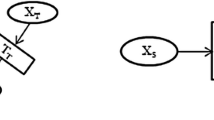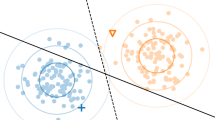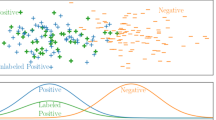Abstract
In this paper we consider the open problem how to unify version-space representations. We present a first solution to this problem, namely a new version-space representation called adaptable boundary sets (ABSs). We show that a version space can have a space of ABSs representations. We demonstrate that this space includes the boundary-set representation and the instance-based boundary-set representation; i.e., the ABSs unify these two representations.
We consider the task of learning ABSs as a task of identifying a proper representation within the space of ABSs depending on the applicability requirements given. This is demonstrated in a series of examples where ABSs are used to overcome the complexity problem of the boundary sets.
Similar content being viewed by others
References
B. Davey and H. Priestly, Introduction to Lattices and Order, 1st ed. (Cambridge University Press, Cambridge, MA, 1990).
D. Haussler, Quantifying inductive bias: AI learning algorithms and Valiant's learning framework, Artificial Intelligence 36(2) (1988) 177–221.
H. Hirsh, Incremental version-space merging: a general framework for concept learning, Ph.D. thesis, Department of Computer Science, Stanford University, Stanford, CA (1989). VTEX(Ramune) PIPS No:5268053 artty:res (Kluwer DORDRECHT v.2003/03/07) amaifa2.tex; 2/02/2004; 8:12; p. 30
H. Hirsh, Polynomial-time learning with version spaces, in: Proceedings of the Tenth National Conference on Artificial Intelligence (AAAI-92), Menlo Park, CA (1992) pp. 117–122.
H. Hirsh, N. Mishra and L. Pitt, Version spaces without boundary sets, in: Proceedings of the Fourteenth National Conference on Artificial Intelligence (AAAI-97), Menlo Park, CA (1997) pp. 491–496.
P. Idemstam-Almquist, Demand networks: an alternative representation of version spaces, Master's thesis, Department of Computer Science and Systems Sciences, The Royal Institute of Technology and Stockholm University, Stockholm, Sweden (1990).
T. Mitchell, Version spaces: an approach to concept learning, Ph.D. thesis, Electrical Engineering Dept., Stanford University, Stanford, CA (1978).
T. Mitchell, Generalization as search, Artificial Intelligence 18(2) (1982) 203–226.
T. Mitchell, Machine Learning (McGraw-Hill, New York, 1997).
G. Sablon, Iterative versionspaces with an application in inductive logic programming, Ph.D. thesis, Katholieke Universiteit Leuven, Leuven, Belgium (1995).
G. Sablon, L. DeRaedt and M. Bruynooghe, Iterative versionspaces, Artificial Intelligence 69(1-2) (1994) 393–410.
M. Sebag and C. Rouveirol, Tractable induction and classification in first order logic via stochastic matching, in: Proceedings of the Fifteenth International Joint Conference on Artificial Intelligence (IJCAI-97), San Francisco, CA (1997) pp. 888–893.
M. Sebag and C. Rouveirol, Resource-bounded relational reasoning: induction and deduction through stochastic matching, Machine Learning 38(1-2) (2000) 41–62.
E. Smirnov, Conjunctive and disjunctive version spaces with instance-based boundary sets, Ph.D. thesis, Department of Computer Science, Maastricht University, Maastricht, The Netherlands (2001).
E. Smirnov and P. Braspenning, Version space learning with instance-based boundary sets, in: Proceedings of the Thirteenth European Conference on Artificial Intelligence (ECAI-98), Chichester, UK (The Best Paper Prize) (1998) pp. 460–464.
E. Smirnov, I. Sprinkhuizen-Kuyper and H. van den Herik, Version space with instance-based boundary sets, submitted.
E. Smirnov, I. Sprinkhuizen-Kuyper and H. van den Herik, One-sided instance-based boundary sets, in: Database Technologies for Data Mining (Spinger,Berlin, 2003).
E. Smirnov and H. van den Herik, Applying preference biases to conjunctive and disjunctive version spaces, in: Proceedings of the Ninth International Conference on Artificial Intelligence: Methodology, Systems, and Applications (AIMSA-2000), Berlin, Germany (2000) pp. 321–330.
B. Smith and P. Rosenbloom, Incremental non-backtracking focusing: a polynomially bounded generalization algorithm for version spaces, in: Proceedings of the Eight National Conference on Artificial Intelligence (AAAI-90), Menlo Park, CA (1990) pp. 848–853.
S. Tong and D. Koller, Support vector machine active learning with applications to text classification, Journal of Machine Learning Research 2 (2001) 45–66.
G. Widmer and M. Kubat (eds.), Machine Learning 32(2), Special Issue on Context Sensitivity and Concept Drift (1998).
Author information
Authors and Affiliations
Rights and permissions
About this article
Cite this article
Smirnov, E., van den Herik, H. & Sprinkhuizen-Kuyper, I. A Unifying Version-Space Representation. Annals of Mathematics and Artificial Intelligence 41, 47–76 (2004). https://doi.org/10.1023/B:AMAI.0000018576.88552.df
Issue Date:
DOI: https://doi.org/10.1023/B:AMAI.0000018576.88552.df




